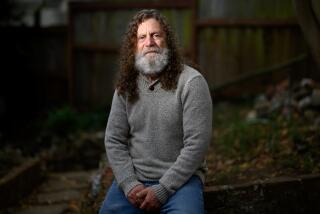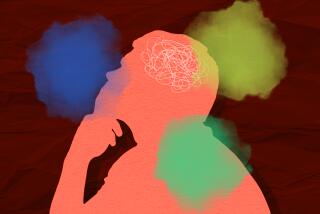Psychologists Say Decisions Are a Snap
- Share via
NEW YORK — Got a tough decision to make? Got a complex set of circumstances? Got all the facts?
Good. Now, forget about it for a while. Then follow your gut.
Counterintuitive as it may be, those rusty old saws about taking a deep breath, getting some distance from a problem and “sleeping on it” turn out to be on the cutting edge of modern psychology.
For a fast-moving society drowning in data and overloaded with options, this is, well, food for thought.
In the journal Science last month, researchers from the Netherlands reported that the more complicated the decision -- such as pondering the acquisition of a house or a mate -- the better the outcome if one simply doesn’t dwell on it.
“It feels like it’s the completely wrong way to make such an important decision,” said Ap Dijksterhuis, the leader of the study at the University of Amsterdam. “It turns out that in some circumstances
“What I found in doing the research I did was the very same thing,” said Lynn Robinson, a corporate consultant in Boston and author of several books on intuition, including the upcoming “Trust Your Gut: Using the Power of Intuition to Grow Your Business.” “A lot of people will say, ‘I immerse myself in data, look at all the facts, and then I listen to my gut.’ ”
Robinson also subscribes to the “sleep on it” school of decision-making -- literally. When confronted with a problem or decision, she said, right before bedtime she will frame a question about what is worrying her.
“Then I ask the question as I’m going to sleep. In the morning, I’ll find the answer kind of formed in my sleep. An idea will kind of pop up in my mind,” she said.
That’s no surprise to Dijksterhuis. “I discovered that ‘to sleep on it’ is almost the same expression in all Western languages,” said the researcher.
“Sleeping on something has a lot of power for a lot of reasons,” said Dr. Judith Orloff, an assistant clinical professor of psychiatry at UCLA who has written books on intuition. “One is that the linear mind is shut off during sleep, so it’s pure intuition.”
She said the only other time the conscious mind is similarly blunted is during movies.
“It’s the one time people get quiet, they stop talking and flow into the plot. They forget about themselves. It’s the only socially condoned altered state,” said Orloff, who coaches other physicians to hone their intuitive skills and use them in patient treatment.
Michael Horowitz, president of the Chicago School of Professional Psychology, pointed out that yoga, running and other kinds of intense exercise are used by many people to free up their unconscious minds.
“We need that quieter, non-conscious process that lets us integrate different sources of content. In a sense, you’re not letting go.... You have inputted the data to the computer, and now you’re letting the computer do the work. Think about it the other way: If you keep sitting there and poring over the data, you can’t be attending to the full data.”
Many successful executives know this instinctively, said Horowitz, whose expertise includes organizational leadership. “A good leader doesn’t get all the data before making a decision. A good leader gets enough data,” he said. Under Horowitz’s tenure, the Chicago School inaugurated the nation’s first doctorate program in business psychology, which also examines decision-making.
The power of the unconscious mind is underrated and underused by many, Horowitz said.
“The brain doesn’t stop just because we’re not conscious. A smaller example of that is when we forget, when we can’t think of a name or a song, the way we get it is to stop working on it,” he said.
At the same time, the Dutchstudy indicated that the simpler the decision, the more useful the application of conscious, rational thought.
Researchers found that people shopping for simple things -- items such as oven mitts, which vary by size and color but little else -- reported more satisfaction with their choice if they tended to be “conscious thinkers” rather than “unconscious thinkers.”
But people shopping for complex items such as furniture, which may involve a number of considerations, tended to be happier with their choice if they were “unconscious thinkers.”
“Although we investigated choices among consumer products in our studies, there is no a priori reason to assume that the deliberation-without-attention effect does not generalize to other types of choices -- political, managerial or otherwise. In such cases, it should benefit the individual to think consciously about simple matters and to delegate thinking about more complex matters to the unconscious,” the Dutch scientists reported.
Research indicates that even a necessarily swift choice based on limited data will produce the best result if one relies more on instinct than intellect. In other words, don’t over-think it.
Malcolm Gladwell, who popularized the potency of gut instinct in his bestseller, “Blink: The Power of Thinking Without Thinking,” made a similar point. “Decisions made very quickly can be every bit as good as decisions made cautiously and deliberately,” he wrote.
Horowitz said, “You can get addicted to conscious, rational processes. But, particularly since we know more and more that so much of our emotion and thinking is not conscious, why spend all our energy for attribution there?”
In “Blink,” Gladwell also cautioned against reflexively assigning more importance to data and documents than to strong, if rationally inexplicable, instincts.
“I think that approach is a mistake and if we are to learn to improve the quality of the decisions we make, we need to accept the mysterious nature of our snap judgments. We need to respect the fact that it is possible to know without knowing why we know and accept that, sometimes, we’re better off that way.”





